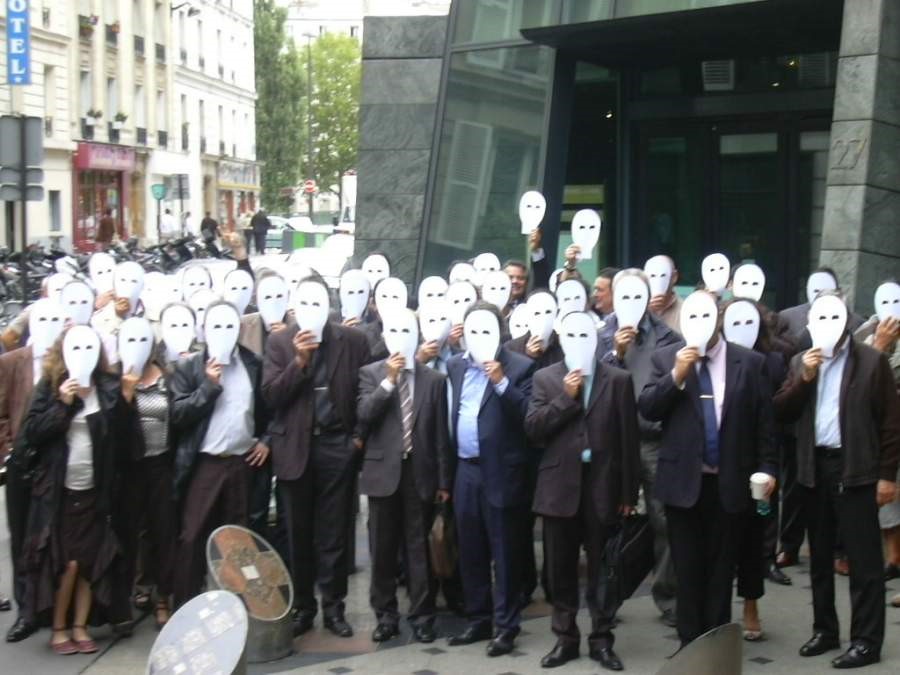
Photo is the author’s work.
The migrant crisis, the seemingly unstoppable rise of terrorism and urban violence, the more secretive rise of multinational companies’ power on a global scale, the growing job precariousness, with workers laboring long hours under hazardous conditions for low pay, all these phenomena picture a world of extreme disequilibrium and powerlessness.
So one should accept one’s fate, be it someone being expelled from the Calais jungle, an exploited worker, an evicted Spaniard, or one of the victims of deadly shots or of a crazy truck in the middle of a street…Is this an excessively somber picture, describing late modern people as alone, cut off from their roots, indifferent or ignorant?
The question is important because sometimes people win over big powers. When they decide not to renounce their rights, the dignity of the worker, insisting that the integrity of social life be defended against the vandalism of corporate rationality, when they radicalize their resistance, certain things are possible. This is what we learn from a three-year online ethnographic study conducted on a group of bloggers, former insurance sellers fired by their company for having refused to change crucial aspects of how they do their job, and how they are paid for a job well done.
What the big company is now asking is sellers to distance themselves from their customers, quit the friendliness of encounters, and diminish the time they spend with them so as to rather increase the number of customers in their portfolio and the performativity of the latter.
Interviewed sellers say that their work ethos has “deteriorated,” while their financial incentives decrease on average by 40%. Around 200 out of 1300 sellers concerned by the new contract decided to refuse and were consequently fired in January 2007. Out of this crowd of recalcitrant workers, 87 sued the company for unfair treatment and brutal practices of lay off.
Struggling against a multinational is not an easy task: in front of them stand 15 renowned lawyers, resisters lack resources like specific resisting skills, they are scattered on the French territory, they do not know each other most of the time. What sort of solidarity can emerge from such lack of cohesion and preparation?
Two resisters decide to use social media to fight, after having met their lawyer several times, who suggested that the 87 “should be more and better united to stand a chance against the company.”
In November 2008, the blog is launched. The 87 sign up and start to send posts where they express their feelings, their current difficulties, their projects “when the fight will be over,” and sharing information about the ongoing judicial procedure. Soon their families and friends shall follow.
The blog served as the instrument of growing friendships behind the screen, of the tightening of solidarity in moments of despair and tragedies (such as three suicides and two lethal cancers among the group over the course of the struggle), and the resulting emotional cohesion. Even more importantly, the blog is the media of the construction of an extremely sophisticated and well-informed collective discourse about company managerial and strategic practices and policies, enhancing substantial legitimacy and solidity of the collective body itself.
“[I]t was the center of my life for more than two years,” says one of the bloggers; “it saved me when I was about to give up”, says another, “because I knew other people were feeling the same somewhere.”
The story does not end on the optimistic effervescence and energy of a collective movement. It is rather a story of radicalization of a group of people with no political or militant affiliations nor any unionist background.
In front of numerous institutional and symbolic obstacles on their way, discouragement gives place to hunger strikes after two years of an exhausting combat: in February 2011, 17 bloggers will successively start a strike every Monday morning, for a period that will eventually last from 14 to 94 days at the end of the struggle.
Media become interested at this point, because this bunch of radicals are neither Irish militants of the blanket revolution, nor extremists ready to sacrifice their life for a given political or ideological cause. They are “normal people,” as one of them said, stripped of their job, identity, health and sometimes family, back to their mother’s house, and not willing to renounce their fight: “Are we radicals?” asks François, while starting to refuse drinking after 34 days of hunger strike.
Afraid of the growing publicity, the company accepted a financial agreement after more than 28 months of everyday resistance. Admittedly, the victory is bitter: 5 of the 87 bloggers have died, the money may not be worth the sacrifices and losses along the way.
But as Roger, one of the hunger strikers, told us two years after the end of this affair: “they will never cease to be haunted by the names of our deceased brothers, by the silent noise of their names, by our collective willingness to never renounce, against all odds. We have repaired part of what has been destroyed, and proven that anyone can do that.”
At a time when radicalism is associated with destruction, terrorism, and brutality, this is a message contrasting with the relentless picture of people at loss, isolated and ready to give their soul to a murderous cause encountered at the corner of their street.

No Comments